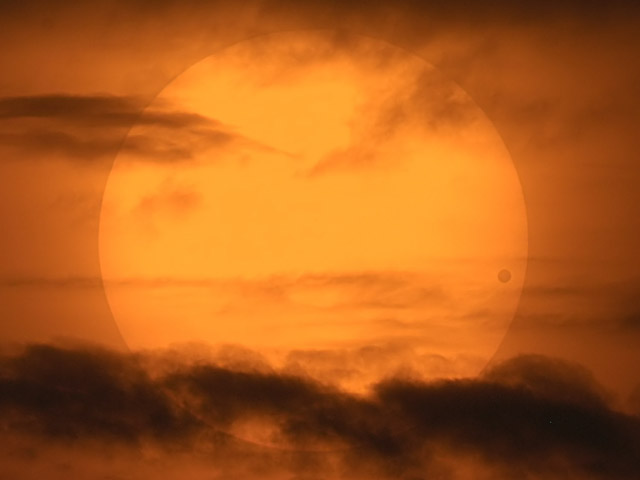
|
Credit & Copyright: David Cortner
Explanation:
The rare
transit of Venus across the face of the Sun earlier this
month was one of the better-photographed events in sky history.
Both scientific and artistic images have been flooding in from the areas that could see the transit: Europe
and much of Asia, Africa, and North America.
Scientifically, solar photographers confirmed that the
black drop effect
is really better related
to the viewing clarity of the camera or telescope than the atmosphere of Venus.
Artistically, images might be divided into several categories.
One type captures the
transit in front of a highly detailed Sun.
Another category captures a double coincidence such as both Venus and an airplane simultaneously silhouetted, or Venus and the International Space Station in low Earth orbit.
A third image type involves a fortuitous arrangement of interesting looking clouds,
as shown by example in the
above image
taken from
North Carolina,
USA.
There the distant orb of giant
Venus might have been mistaken,
at first glance, for a small but unusually circular cloud.
|
January February March April May June July August September October November December |
| ||||||||||||||||||||||||||||||||||||||||||||||||
NASA Web Site Statements, Warnings, and Disclaimers
NASA Official: Jay Norris. Specific rights apply.
A service of: LHEA at NASA / GSFC
& Michigan Tech. U.
Based on Astronomy Picture
Of the Day
Publications with keywords: Venus - transit - Sun
Publications with words: Venus - transit - Sun
See also:
- APOD: 2026 February 11 Á A Year of Sunspots
- APOD: 2026 February 8 Á Active Sunspot Region 4366 Crosses the Sun
- APOD: 2025 December 7 Á The Sun and Its Missing Colors
- APOD: 2025 May 21 Á International Space Station Crosses the Sun
- APOD: 2025 May 11 Á The Surface of Venus from Venera 14
- The ISS Meets Venus
- APOD: 2025 March 16 Á Venus and the Triply Ultraviolet Sun
